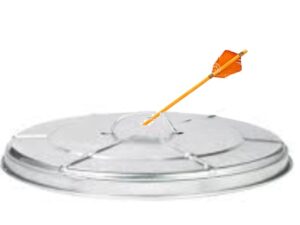
I’m hunkered down under a metal garbage can lid
Waiting for my arrow to return to the ground with a thunk
The arrow I had just shot straight into the sky
With as much force as my little boy muscles could muster
And with all my imagination did I picture
It climbing climbing and gradually gracefully
Slowing and eventually stopping Yes stopping
For a millisecond midair I now see it
Dropping dropping backwards and very slowly turning
Turning to point straight downward as it falls
Gaining velocity heading back toward me
Me waiting under my metal shield
What a little fool I was
Foolish to think that I was protected but
How I craved to be targeted by a worthy foe
Who would not hold back or pretend
As I grew older I shot my arrows at targets
Mounted on bales of straw deep deep into the bales
I also taught myself how to throw a knife
And shoot a gun All useless skills Useless
………………..
On the Poetry Foundation website Michael Torress quotes John Berryman as saying, “You should always be trying to write a poem you lack the technique, the language, the courage to achieve. Otherwise you’re merely imitating yourself, going nowhere, because that’s always easiest.” He also says that there are some images or memories that never completely go away, like a lost dog who (as in a recurrent dream) keeps finding its way back home, home being the reluctant writer’s poetic imagination. That description fits this image of little-boy me crouching under the garbage can lid after having shot an arrow straight up into the sky (with my not-so-little-boy bow) and actually trying to get it to hit my “shield” because that was my way of simulating a real battle where an enemy is actually trying to kill me! What I am saying in the poem, or wishing, is that men (in general) could get this lust for battle and yearning to confront the archetypal foe, out of the way and lived-out at an early age, to clear the deck for learning how to conceive a world without war and without feeding into a culture of violence.
The poem accelerates the passage of time in 5 stanzas to reflect my impatience, not just with my own lack of satisfaction with the world in which I have grown old, but with men. I am not interested in working this poem into a form that is easy to digest. Even after all the life I have lived, there is no consolation in recalling how anxiously I put my life at risk, imagining, from the earliest age, that one had to be a warrior to survive. It took me years to come around to seeing myself as a pacifist and finding my center in a life of non-violence.
